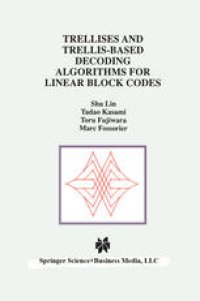
Ebook: Trellises and Trellis-Based Decoding Algorithms for Linear Block Codes
- Tags: Electrical Engineering, Computer Communication Networks, Signal Image and Speech Processing, Discrete Mathematics in Computer Science, Information and Communication Circuits
- Series: The Springer International Series in Engineering and Computer Science 443
- Year: 1998
- Publisher: Springer US
- Edition: 1
- Language: English
- pdf
As the demand for data reliability increases, coding for error control becomes increasingly important in data transmission systems and has become an integral part of almost all data communication system designs. In recent years, various trellis-based soft-decoding algorithms for linear block codes have been devised. New ideas developed in the study of trellis structure of block codes can be used for improving decoding and analyzing the trellis complexity of convolutional codes. These recent developments provide practicing communication engineers with more choices when designing error control systems.
Trellises and Trellis-based Decoding Algorithms for Linear Block Codes combines trellises and trellis-based decoding algorithms for linear codes together in a simple and unified form. The approach is to explain the material in an easily understood manner with minimal mathematical rigor.
Trellises and Trellis-based Decoding Algorithms for Linear Block Codes is intended for practicing communication engineers who want to have a fast grasp and understanding of the subject. Only material considered essential and useful for practical applications is included. This book can also be used as a text for advanced courses on the subject.
As the demand for data reliability increases, coding for error control becomes increasingly important in data transmission systems and has become an integral part of almost all data communication system designs. In recent years, various trellis-based soft-decoding algorithms for linear block codes have been devised. New ideas developed in the study of trellis structure of block codes can be used for improving decoding and analyzing the trellis complexity of convolutional codes. These recent developments provide practicing communication engineers with more choices when designing error control systems.
Trellises and Trellis-based Decoding Algorithms for Linear Block Codes combines trellises and trellis-based decoding algorithms for linear codes together in a simple and unified form. The approach is to explain the material in an easily understood manner with minimal mathematical rigor.
Trellises and Trellis-based Decoding Algorithms for Linear Block Codes is intended for practicing communication engineers who want to have a fast grasp and understanding of the subject. Only material considered essential and useful for practical applications is included. This book can also be used as a text for advanced courses on the subject.
As the demand for data reliability increases, coding for error control becomes increasingly important in data transmission systems and has become an integral part of almost all data communication system designs. In recent years, various trellis-based soft-decoding algorithms for linear block codes have been devised. New ideas developed in the study of trellis structure of block codes can be used for improving decoding and analyzing the trellis complexity of convolutional codes. These recent developments provide practicing communication engineers with more choices when designing error control systems.
Trellises and Trellis-based Decoding Algorithms for Linear Block Codes combines trellises and trellis-based decoding algorithms for linear codes together in a simple and unified form. The approach is to explain the material in an easily understood manner with minimal mathematical rigor.
Trellises and Trellis-based Decoding Algorithms for Linear Block Codes is intended for practicing communication engineers who want to have a fast grasp and understanding of the subject. Only material considered essential and useful for practical applications is included. This book can also be used as a text for advanced courses on the subject.
Content:
Front Matter....Pages i-xi
Introduction....Pages 1-4
Linear Block Codes....Pages 5-22
Trellis Representation of Linear Block Codes....Pages 23-42
State Labeling, Trellis Construction Procedures and Trellis Symmetry....Pages 43-57
Trellis Complexity....Pages 59-69
Trellis Sectionalization....Pages 71-91
Parallel Decomposition and Low-Weight Subtrellises....Pages 93-113
Methods for Constructing Codes and Trellises....Pages 115-147
Trellises for Convolutional Codes and their Related Linear Block Codes....Pages 149-174
The Viterbi and Differential Trellis Decoding Algorithms....Pages 175-193
A Recursive Maximum Likelihood Decoding....Pages 195-219
An Iterative Decoding Algorithm for Linear Block Codes Based on a Low-Weight Trellis Search....Pages 221-241
The Map and Related Decoding Algorithms....Pages 243-256
Back Matter....Pages 257-284
As the demand for data reliability increases, coding for error control becomes increasingly important in data transmission systems and has become an integral part of almost all data communication system designs. In recent years, various trellis-based soft-decoding algorithms for linear block codes have been devised. New ideas developed in the study of trellis structure of block codes can be used for improving decoding and analyzing the trellis complexity of convolutional codes. These recent developments provide practicing communication engineers with more choices when designing error control systems.
Trellises and Trellis-based Decoding Algorithms for Linear Block Codes combines trellises and trellis-based decoding algorithms for linear codes together in a simple and unified form. The approach is to explain the material in an easily understood manner with minimal mathematical rigor.
Trellises and Trellis-based Decoding Algorithms for Linear Block Codes is intended for practicing communication engineers who want to have a fast grasp and understanding of the subject. Only material considered essential and useful for practical applications is included. This book can also be used as a text for advanced courses on the subject.
Content:
Front Matter....Pages i-xi
Introduction....Pages 1-4
Linear Block Codes....Pages 5-22
Trellis Representation of Linear Block Codes....Pages 23-42
State Labeling, Trellis Construction Procedures and Trellis Symmetry....Pages 43-57
Trellis Complexity....Pages 59-69
Trellis Sectionalization....Pages 71-91
Parallel Decomposition and Low-Weight Subtrellises....Pages 93-113
Methods for Constructing Codes and Trellises....Pages 115-147
Trellises for Convolutional Codes and their Related Linear Block Codes....Pages 149-174
The Viterbi and Differential Trellis Decoding Algorithms....Pages 175-193
A Recursive Maximum Likelihood Decoding....Pages 195-219
An Iterative Decoding Algorithm for Linear Block Codes Based on a Low-Weight Trellis Search....Pages 221-241
The Map and Related Decoding Algorithms....Pages 243-256
Back Matter....Pages 257-284
....